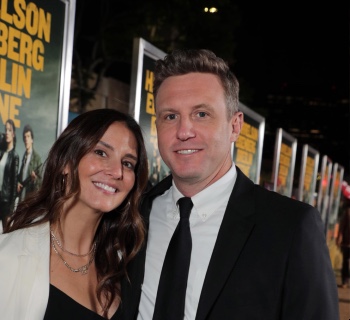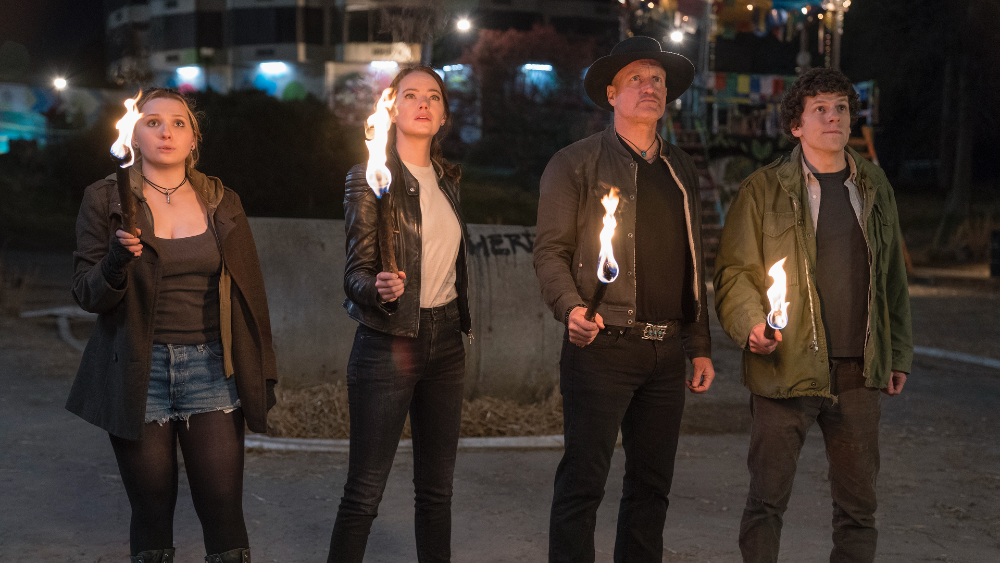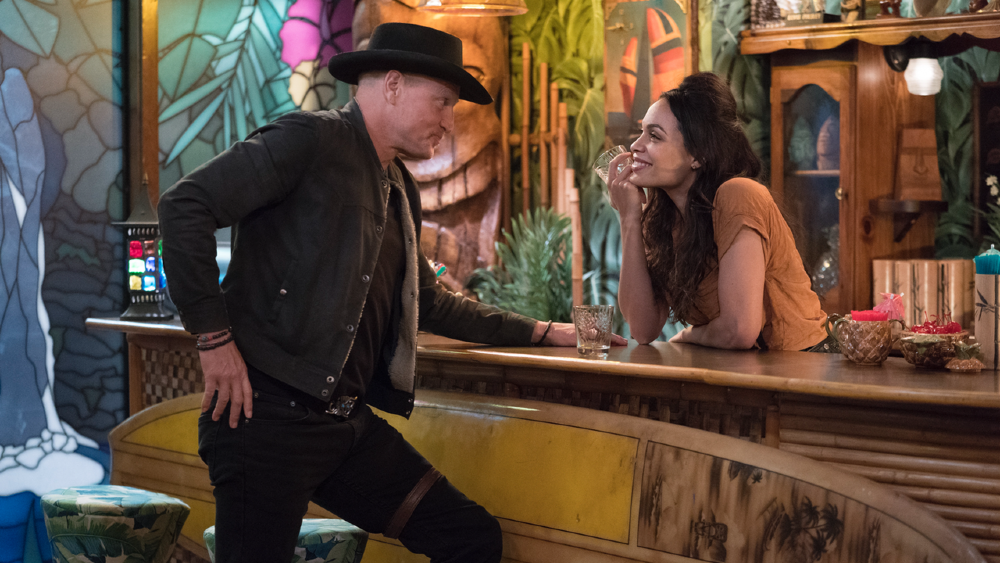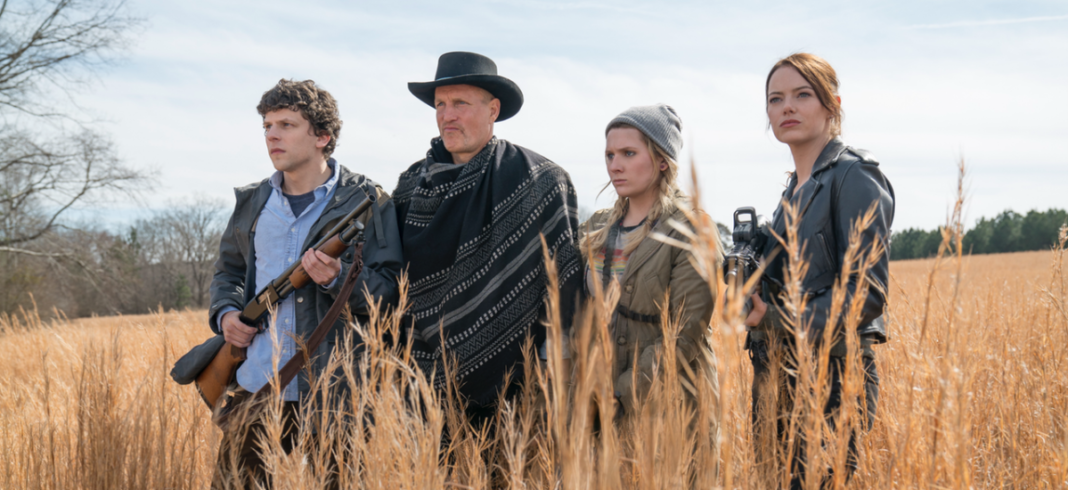It’s hard to believe that it’s been ten years since the zombie action-comedy Zombieland hit theaters, but somehow, all your favorite zombie-killers are back for Zombieland: Double Tap.
That last part might be harder to fathom when you consider the amazing things everyone’s been doing since the first movie. At least three of the cast have been nominated for Oscars, and Emma Stone won an Oscar for La La Land. Director Ruben Fleischer had a sizable hit with last year’s Venom, while writers Rhett Reese and Paul Wernick had great success writing for Ryan Reynolds’ Deadpool, all of which may have helped convince Sony to let them make this sequel.
Ten years after the first movie, Woody Harrelson’s Tallahassee, Jesse Eisenberg’s Columbus, Emma Stone’s Wichita and Abigail Breslin’s Little Rock are living the high-life in the White House. Little Rock is getting antsy, wanting to see the world and find a boyfriend, so she runs off with a New Age musician named Berkeley (Avan Jogia). Columbus has learned that the zombies have gotten much smarter and faster, so they head out after Little Rock. Along the way, they meet the likes of Zooey Deutch’s dingbat airhead Montana, and characters played by Luke Wilson, Thomas Middleditch and Rosario Dawson, who seem to have quite a bit in common with our family.
The Beat got on the phone with Fleischer last week, excited to get to talk to him about a sequel that I personally never thought would happen.

The Beat: I literally thought I’d never see another Zombieland movie, so how did this come about? Was Venom already underway?
Ruben Fleischer: Oh yeah, we’ve been working on this movie for I think you can safely say 10 years, but if not, a minimum of five. After the original, we came up with the sequel idea that they wrote a script for that, ultimately, I think we collectively decided wasn’t the best next chapter of the story, so we put it on the shelf for a minute. I went off and made 30 Minutes or Less and I made Gangster Squad. It was after those movies that I reflected on the original design plan and realized just how amazing that experience was and how lucky I was to get to work with that cast, so I decided to try and resurrect it. At that time, Rhett [Reese] and Paul [Wernick] were very busy doing Deadpool, so they weren’t available to write, but they came on as executive producers. We worked with some writers to try and crack this story. There were multiple drafts over the course of the last five years that resulted into a final draft that Rhett and Paul did, which became the shooting script.
The Beat: As time passed, time actually passed as all the actors became busy doing other things, including winning Oscars. Abigail obviously is no longer a teenager anymore, so that must have become an important part of the plot.
Fleischer: Yeah, I think the whole premise of the movie is based on the passage of time and that Little Rock is not a little girl anymore. She’s a young woman who wants to have her own life and get out on her own and be outside of the family and meet a boy. The time actually really benefited us in terms of being able to use it to drive story.
The Beat: I remember speaking to you back when you were making the first movie. Did you feel you were able to be more involved with the course of the sequel from the very beginning, developing the story and bringing in things that you wanted to bring in?
Fleischer: It was a real partnership between all of us trying to crack the story and service the characters, but no, it was me, the cast, Rhett and Paul, the producer all working together to figure out the best version of the story.
The Beat: What did you personally want to bring to this movie? Were there things you wanted to do that maybe you didn’t get to do in the first movie?
Fleischer: I was really excited to do some bigger action. I think the whole monster truck sequence with the CG zombies is really, really cool. I’m really proud of the production design. I think the Hound Dog is a pretty cool location and designing Babylon, both the ground level part of it and then the rooftop was a really fun challenge. What else? Oh, casting was really fun, too, being able to try and find some really great new actors to join the world of Zombieland. I’m really proud of the performances that Rosario and Zoey and Thomas and Luke and Avan all gave us. I thought they were really great additions to the world.
The Beat: You actually made a nice segue into what I was going to ask you, which was about bringing Zoey into the mix as Montana. She is absolutely hilarious. I’ve seen her in a lot of movies over the years but never in a role like this, so what was involved with creating that character with her?
Fleischer: I wasn’t actually familiar with her prior to our audition. In the audition, she was just so funny and had such an unexpected take on the character and that it blew me away. So I was thrilled to be able to cast her. I’m just so proud of the performance she gave, and I think a lot of people are going to be very excited to see her in this movie and also to see what she does next.

The Beat: Were you able to meet with the cast to talk with them about the script as it developed, either separately or as a group?
Fleischer: Once we felt like we had a draft worthy of sharing with them, we’d give it to them for their feedback, and they definitely had opinions about it. We worked really hard to incorporate as much as their input as we could. For example, I think the whole Elvis subplot sparked from Woody’s own personal love of Elvis. So yeah, they really did inform the movie in real ways.
The Beat: When you were back on set for the first day of filming, was it really easy to get back into it, as if 10 years hadn’t passed?
Fleischer: The great thing is that I’ve maintained a relationship with all of them, Jesse and Emma and Woody were all in subsequent movies that I did. Jesse and Woody were in the Now You See Me movies together. Woody and Emma are really good friends, and we all love Abby, so it just really was like yesterday we just fell right back into place.
The Beat: What was involved with recreating the White House and its interiors? Was that mostly working with pictures to make it look as realistic as possible?
Fleischer: Yeah. Realistic, but with our own spin on it. What would it be like if you lived in the post-apocalypse and you can go pilferthe Smithsonian for anything you want and just decorate your house with Bob’s Big Boy statues and artwork from the National Gallery and everything else. That was really fun, but I also was excited about the way we were able to make it all look very overgrown with vines and trying to think about what it would be like if there was no one there to take care of the White House and nature crawled back out on top of it all.
The Beat: Where’d you end up shooting this one? Back in Atlanta again?
Fleischer: It was – we were in Atlanta.
The Beat: I was marveling at the big abandoned highways you created again.
Fleischer: That big abandoned highway was actually in Macon, Georgia. We went to Macon for a week when the Super Bowl was in towns, because it actually was in Atlanta this past year. It was just really hard to work in the city because it was such a big event — getting cuts and stuff that we needed weren’t as easy, so we went to Macon and that’s where we found that incredible overpass and where we shot that RV battle as well.
The Beat: Was there a lot of overlap between this and finishing Venom or did you literally finish that one and go right into this one?
Fleischer: Well, I was starting this movie before Venome ven came about over the course of all the drafts, so I’ve been working on this movie for a long time. But yeah, when I was in post on Venom was when we started getting real locked in on the date. We were not in a hard prep, but in soft prep. I think it maybe was like story boarding and doing some other stuff while in post on Venom. Then with Venom,I just worked basically all the way up to its release, and then I had a week off to go on vacation with my family. I came back and started prep the next day and three weeks later was in Atlanta. So yeah, it was really back to back. I think once I’m done with press today, actually I have to go do something next week, but after that it’ll be my first time not working on a movie in two and a half years, so I’m looking forward to a little break.

The Beat: There was about five years between Gangster Squad and Venom where you were developing that movie, this one and some television stuff, but were you developing other things as well?
Fleischer: That’s really been what’s occupied the bulk of my time. I have this production company, we have a deal at ABC, but we have three shows on TV that we produce. That’s been a really fun to get to work in television and to be a part of some pretty cool shows.
The Beat: How are you able to balance all of that stuff while shooting a movie? Are you spending a lot of time during the shoot watching stuff that’s going on in the shows?
Fleischer: It’s a combination of things. Certain things I’m more directly involved with and other things are more on a macro level. For example, while we were shooting Zombieland, they were shooting the pilot for Stumptown, which I co-produced, so it was all in the background, I guess. I have a great producing partner who’s responsible for the bulk of the TV development.
The Beat: I haven’t seen Stumptown yet, but I spoke to Michael Ealy about it, and it sounds fun.
Fleischer: It’s pretty great.
The Beat: Were you developing anything in those five years that didn’t happen that you might revisit?
Fleischer: No, I don’t have anything lined up right now. I mean there’s various projects that came and went or maybe someday will come together, but right now I’m excited to figure out what’s next, but I don’t have it lined up yet.
The Beat: I thought there was a Chris Evans movie….
Fleischer: That was prior to Venom. It was Jekyll, but it really overlaps in a lot of ways with Venom just given the Jekyll and Hyde nature of Venom, so when I left to do Venom it was the end of the possibility of doing Jekyll.
The Beat: I never got a chance to talk to you about the music on the first Zombieland, but I loved that soundtrack and constantly had it on my iPod. I also know composer Dave Sardy from my days in the studio, having worked with his band. How did you go into the music for this one?
Fleischer: That’s awesome. He’s an incredible composer and I was really lucky to get to work with him again on this movie. The score is I think a real signature of the first film – it’s just different from traditional movies scores, I think in large part because he’s a record producer and produces lots of rock bands, there’s a real kind of indie rock aspect to the score that I think makes it really distinctive. We also both both love Westerns and always saw Zombieland as the Western and tried to incorporate elements of [Ennio] Morriconeand other beloved Western scores as aspects of our movie. But yeah, he’s a real talent and I felt really lucky to get to work with him again.
The Beat: I wanted to ask about the title sequence with Master of Puppets. How long did it take to shoot that?
Fleischer: That was just one day.
The Beat: Really? Wow.
Fleischer: There’s a really cool camera called a Phantom that shoots up to a thousand frames per second. I think we shot around 450 frames a second and that allows for that super cool slo-mo effect. That was the same camera that we used in the first movie, so we were really excited to do an alt version of the slo-mo zombies. The first movie was vignettes of the apocalypse as it was happening, so it was fun to be able to do it with the cast and feature them in the middle of it all.
The Beat: Did you spend a lot of time rehearsing with the cast to pull that off?
Fleischer: We rehearsed a little bit with them, but they’re all pretty capable at doing action. The most fun though was Emma shooting a machine gun. She definitely never had done that before. I remember early on when she showed up, she just had been nominated for an Oscar for The Favourite, so she’s like this very prestigious actress and put a machine gun in her hands, it was just a much different set of tools for her to access.
Zombieland: Double Tap hits theaters nationwide on Thursday, October 17.









No thanks. I thought the original was just a typical zombie movie. No imagination. Having Bill Murray play himself and then killing him just made it more annoying.
Comments are closed.